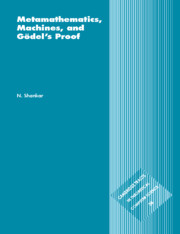3 - Derived Inference Rules
Published online by Cambridge University Press: 16 October 2009
Summary
But formalized mathematics cannot in practice be written down in full.… We shall therefore very quickly abandon formalized mathematics
N. Bourbaki [Bou68]In the previous chapter we defined a proof-checking program to check formal proofs constructed according to the axioms and rules of inference of the formal system Z2. In order to make progress towards the goal of proving the incompleteness of Z2, we need to formally develop a small amount of mathematics within Z2. While it is true that constructing formal proofs is very tedious, we have no intention of abandoning formalized mathematics. We will show in this chapter that formal proofs can be constructed in bigger and more natural steps by using powerful derived inference rules. These are inference rules whose application can always be eliminated in favor of the primitive axioms and inference rules of Z2. In other words, the soundness of these rules can be proven as a metatheorem. These derived rules do not yield any new theorems but they make the process of formal proof construction more natural and less laborious.
We demonstrate how the Boyer–Moore theorem prover can be used to prove and use derived inference rules to construct nontrivial formal proofs. Most of this chapter is an exposition of one powerful derived inference rule which states that all propositional tautologies are theorems of Z2. We also list several other derived inference rules that were similarly proved.
Metamathematical Extensibility
While it is, in principle, possible to use the proof checker Proves to construct and check formal proofs of interesting theorems, it would require an unrealistic amount of labor.
- Type
- Chapter
- Information
- Metamathematics, Machines and Gödel's Proof , pp. 71 - 90Publisher: Cambridge University PressPrint publication year: 1994

